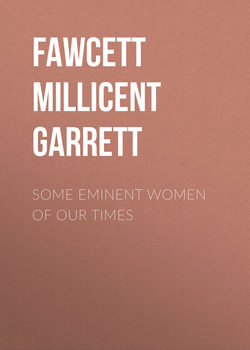Some Eminent Women of Our Times

Реклама. ООО «ЛитРес», ИНН: 7719571260.
Оглавление
Fawcett Millicent Garrett. Some Eminent Women of Our Times
I. ELIZABETH FRY
II. MARY CARPENTER
III. CAROLINE HERSCHEL
IV. SARAH MARTIN. THE DRESSMAKER AND PRISON VISITOR OF YARMOUTH
V. MARY SOMERVILLE
VI. QUEEN VICTORIA1
VII. HARRIET MARTINEAU
VIII. FLORENCE NIGHTINGALE
IX. MARY LAMB
X. AGNES ELIZABETH JONES
XI. CHARLOTTE AND EMILY BRONTË
XII. ELIZABETH BARRETT BROWNING
XIII. LADY SALE AND HER FELLOW-HOSTAGES IN AFGHANISTAN
XIV. ELIZABETH GILBERT
XV. JANE AUSTEN
XVI. MARIA EDGEWORTH
XVII. QUEEN LOUISA OF PRUSSIA
XVIII. DOROTHY WORDSWORTH
XIX. SISTER DORA
XX. MRS. BARBAULD
XXI. JOANNA BAILLIE
XXII. HANNAH MORE
XXIII. THE AMERICAN ABOLITIONISTS. PRUDENCE CRANDALL AND LUCRETIA MOTT
Отрывок из книги
The following short sketches of the lives of some of the eminent women of our times were written for The Mothers’ Companion, and are now republished by the kind permission of the proprietors and publishers, Messrs. Partridge.
They were suggested by the fact that nearly all the best contributions of women to literature have been made during the last hundred years, and simultaneously with this remarkable development of literary activity among women, there has been an equally remarkable activity in spheres of work held to be peculiarly feminine. So far, therefore, from greater freedom and better education encouraging women to neglect womanly work, it has caused them to apply themselves to it more systematically and more successfully. The names of Elizabeth Fry, Mary Carpenter, Sarah Martin, Agnes Jones, Florence Nightingale, and Sister Dora are a proof of this. I believe that we owe their achievements to the same impulse which in another kind of excellence has given us Jane Austen, Charlotte Brontë, and Elizabeth Browning.
.....
Mrs. Fry’s philanthropy was not of a kind to be checked by a ballad, and she went on perseveringly with her work; the school was formed, and a prisoner, named Mary Cormor, was the first schoolmistress. A wonderful change gradually became apparent in the demeanour, language, and appearance of the women in prison. In 1817 an association was formed for carrying on the work Mrs. Fry had begun. It was called “An Association for the Improvement of the Female Prisoners in Newgate.” Its first members were eleven Quakeresses and one clergyman’s wife. Public attention was now alive to the importance of the work; and in the following year a Select Committee of the House of Commons was appointed to inquire and report upon the condition of the London prisons. Mrs. Fry was examined before this committee. Her chief recommendations were that the prisoners should be employed in some industry, and be paid for their work, and that good conduct should be encouraged by rewards; she was also most urgent that the women prisoners should be in the charge of women warders. Her work in the prison naturally led her to consider the condition and ultimate fate of women who were transported. Transportation was then carried out upon a large scale, and all the evils of the prison existed in an intensified form on board the transport ships. The horrors of the voyage were followed by a brutal and licentious distribution of the women on their arrival to colonists, soldiers, and convicts, who went on board and took their choice of the human cargo. Mrs. Fry’s efforts resulted in a check being placed on these shameful barbarities. The women were, owing to her exertions, sent out in charge of female warders, and they were provided with decent accommodation on their arrival.
Like Howard, Mrs. Fry did not confine her efforts to the poor and wretched of her own country. She visited foreign countries in order thoroughly to study various methods of prison work and discipline. On one occasion she found in Paris a congenial task in bringing the force of public opinion to bear on the treatment of children in the Foundling Hospital there. The poor babies were done up in swaddling clothes that were only unwrapped once in twelve hours. There was no healthy screaming in the wards, only a sound that a hearer compared to the faint and pitiful bleating of lambs. A lady who visited the hospital said she never made the round of the spotlessly clean white cots, without finding at least one dead baby! Everything in the hospital was regulated by clockwork; its outward appearance was clean and orderly in the extreme, but the babies died like flies! The Archbishop of Paris was vastly annoyed with Mrs. Fry for pointing out this drawback to the perfect organisation of the institution; but when once the light was let in, improvement followed.
.....